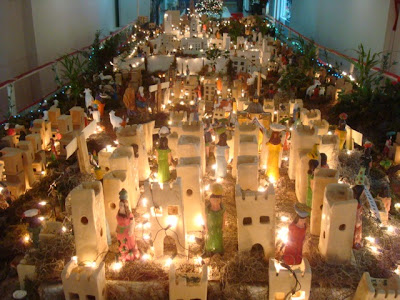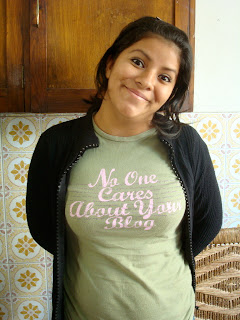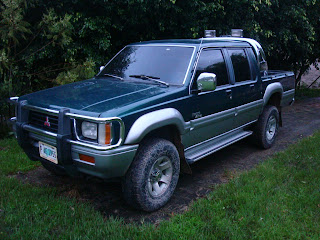For Thanksgiving, we decided to make a traditional meal and invite over some friends from the Baxter Institute, a Bible college in Tegucigalpa. We had a little trouble finding some of the ingredients, but a couple days and about five grocery stores later, we had everything we needed for a feast of turkey, stuffing, green beans, broccoli-cheese casserole, mashed potatoes & gravy, cranberry sauce and pumpkin pie.
Our guests, Osbel Brito & Madelin Lugones (and Harry), and Juan Carlos de los Santos were very brave to try so much strange food and seemed to like everything well enough. They were also very patient with our butchering of their beautiful language. The most difficult part of the night for me was attempting to explain the origins of Thanksgiving in Spanish--I can barely do it in English.
It so happens that Osbel is from Cuba and Juan Carlos is from the Dominican Republic, so in a country like Honduras, whose sporting interests essentially begin and end with futbol, it was a pleasure to talk baseball with a couple of guys who, like me, had grown up playing the sport and idolizing its stars. We compared stories of imaginatively creating variations of baseball depending on the space, equipment, and players available. One of the biggest reasons that soccer is so popular in Honduras and around the world is that, really, all you need is a ball and you've got a game. Baseball, on the other had, does require a few more things, but it's amazing what young (or not so young) kids can come up with when you really want to play. I told them about playing with my brother with a ball we made out of socks, hitting walnuts with an old bat, and of course trying to explain wiffleball. They told about using oranges, the little ball from roll-on deodorant, and even hitting plastic caps from a water bottle with a broomstick or a piece of bamboo. It has always been amazing to me to know that even in the poverty of some Latin American and Caribbean countries, some of the best players in the history of the game have come from these very humble beginnings.
If you're a baseball fan, you've probably heard some of these stories. One of the things you hear about is the kids who grew up improvising with whatever was handy to make a baseball glove. It's kind of a legendary thing that you hear some commentator mention every now and then: the slick-fielding all-star with the multi-million dollar contract who grew up so poor that he learned to play the game using a cardboard glove (a recent example of this is Mets shortstop Jose Reyes, from the Dominican). I asked Osbel and Juan Carlos if these stories were true--if that really was common; and how exactly did that work? They immediately said yes, that in their countries it was extremely common and a kind of an art-form. They said that they had made and played with many cardboard gloves as kids. Well, I immediately ran to get a cardboard box and a utility knife and was amazed to watch them work, and in short order they produced a simple but effective baseball glove. Incredible.



 |
| it can even double as a catcher's mask |
We certainly missed being with our families on Thanksgiving, but we had a great one with good friends and lots of good food. It was one of my most memorable, and for our guests, I feel safe in saying that it was the best traditional American Thanksgiving dinner they had ever had.
























